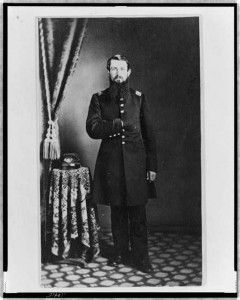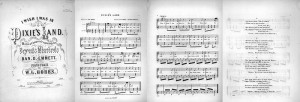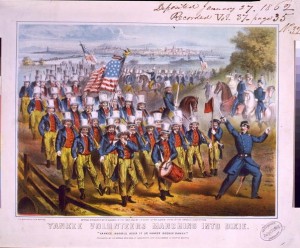Apparently some Union soldiers are on leave in Canada – and getting razzed by a few Torontans.
From The New-York Times December 15, 1861:
HOW AMERICANS ARE TREATED IN TORONTO.
The following characteristic article appears in the Toronto Leader:
“An officer of the Federal army has been parading the streets of Toronto in full dress, these two or three days. He is in bran-new, bright and shining Yankee uniform; and some indignation has been excited by the impertinent display. It is remembered that a British officer, off duty, in his own town, wears a plain undress garb; and that in another country he would appear as an ordinary civilian. Northern officers, it is said, should behave with equal propriety. Perhaps, however, the suggestion presupposes too much. Our visitor may not have another coat. While parading King-street yesterday, several young urchins, as well as one or two “children of larger growth,” cried out loudly, “Bull Run!” but instead of blushing for his country, he seemed to acquire a more magnificent strut by the notice he attracted, uncomplimentary as it was. The display reminded one of the immortal “Petaw,” who, had he been present, would have seen his honor incontinently vanish.
On Friday evening last a scene occurred in one of our favorite saloons which shows the current of popular opinion in this city. A valiant warrior clothed in the blue and brass of the United States service entered and seated himself at one of the tables. A Southerner in the room — a gentleman from Louisiana unable to get home — betrayed considerable excitement, and presently called for “Dixie’s Land.” The musicians struck up the air, which in this neighborhood is understood to be particularly offensive to the North, and the voices of all in the crowded saloon joined in the loud and stirring chorus. The Yankee soldier looked abashed, and something being said about Bull Run, he soon beat a hasty retreat amid the laughter of all present.”
Canada was ambivalent during the American Civil War, sort of like the (Dis)united States themselves and even the song Dixie , which had both southern and northern lyrical versions during the Civil War.



